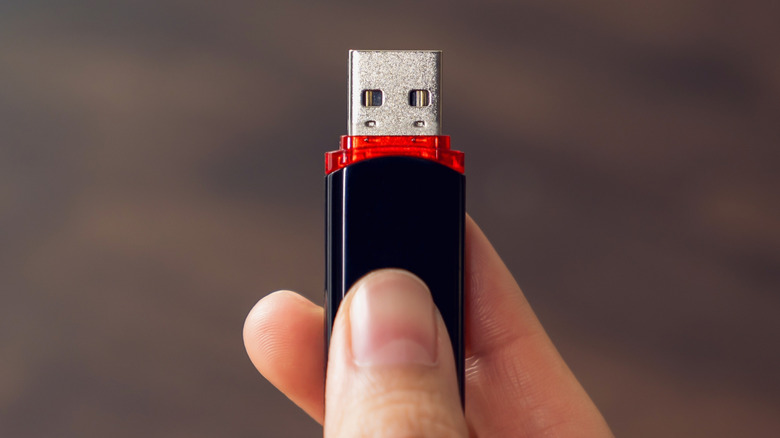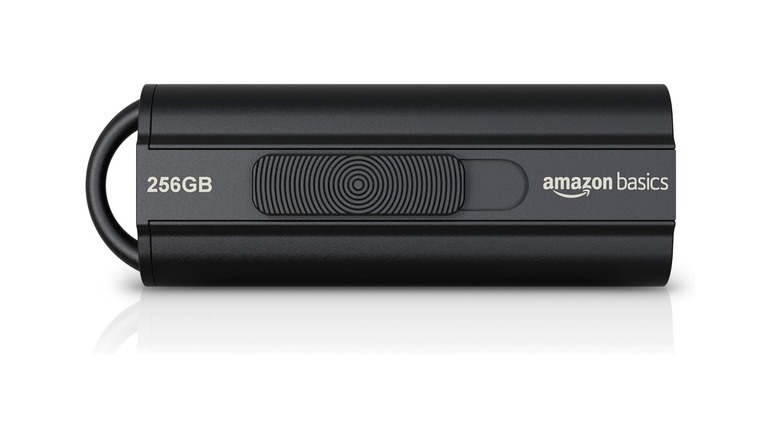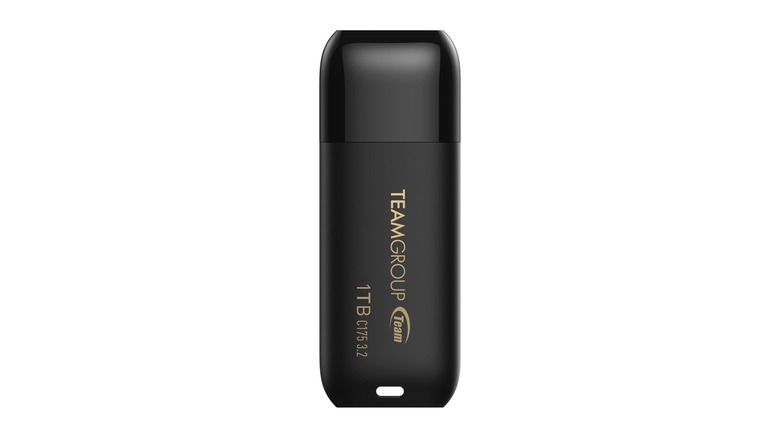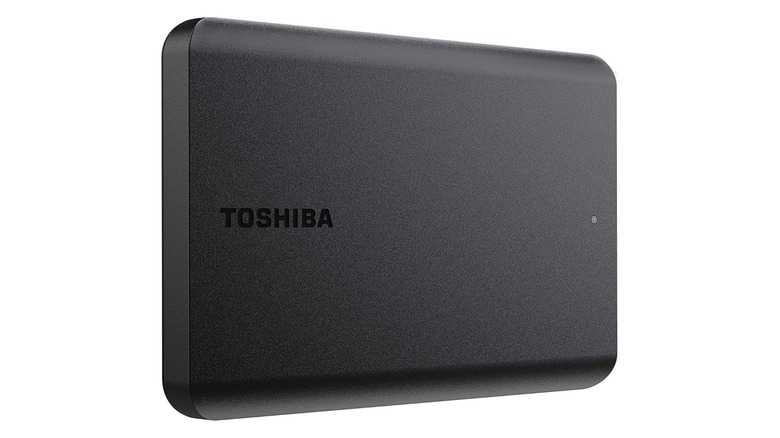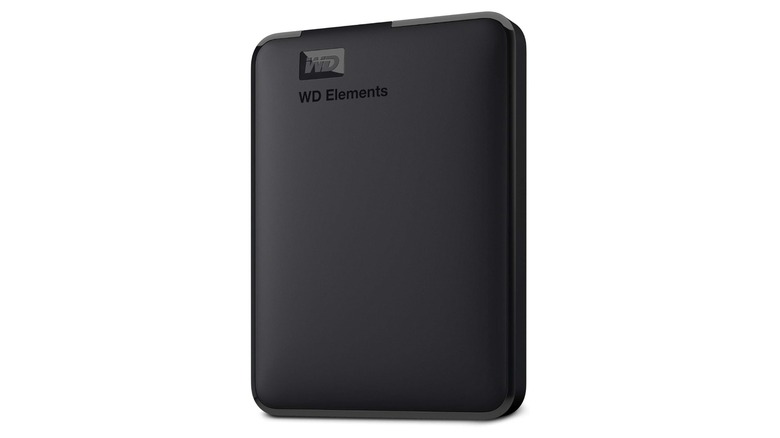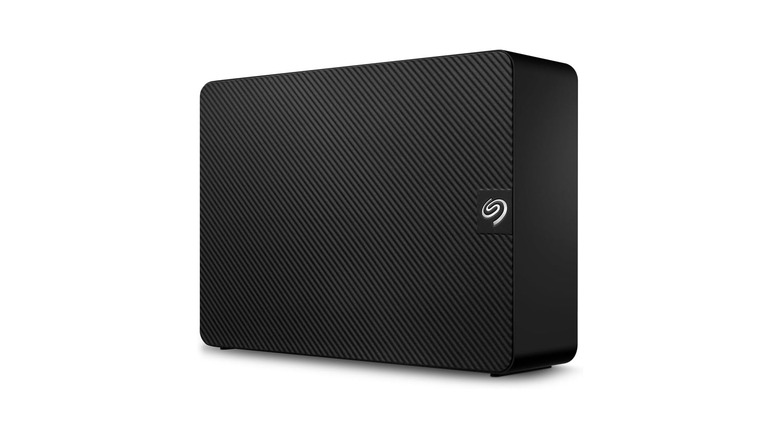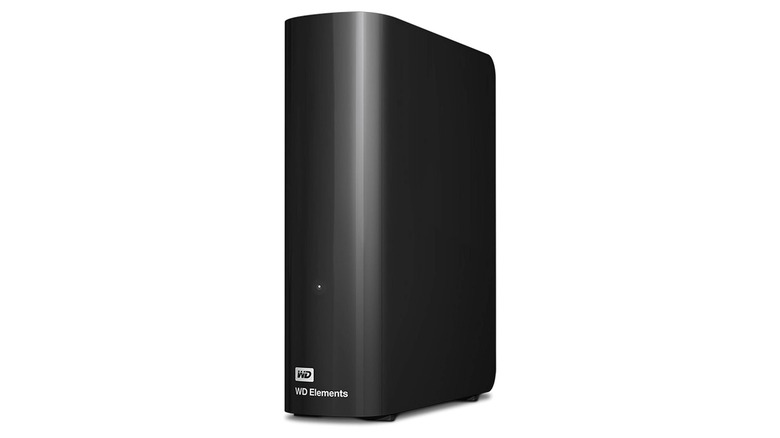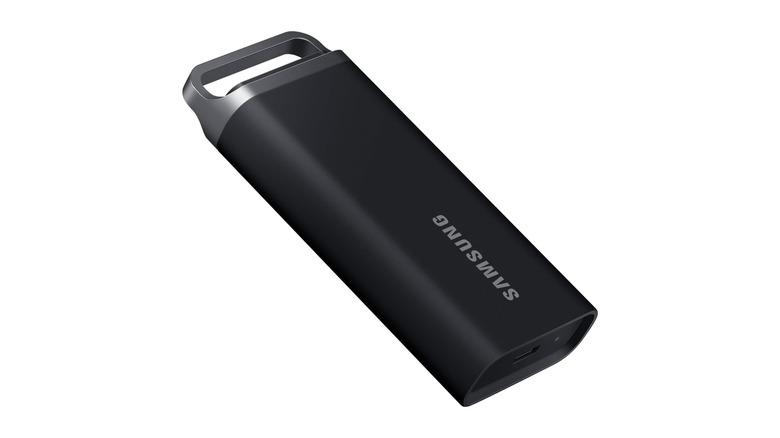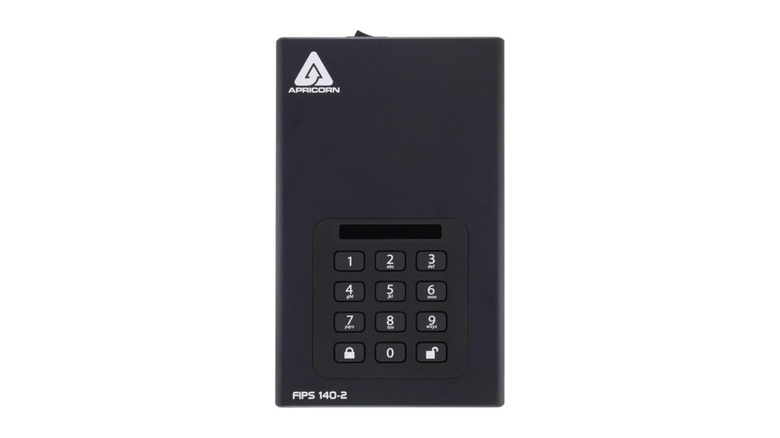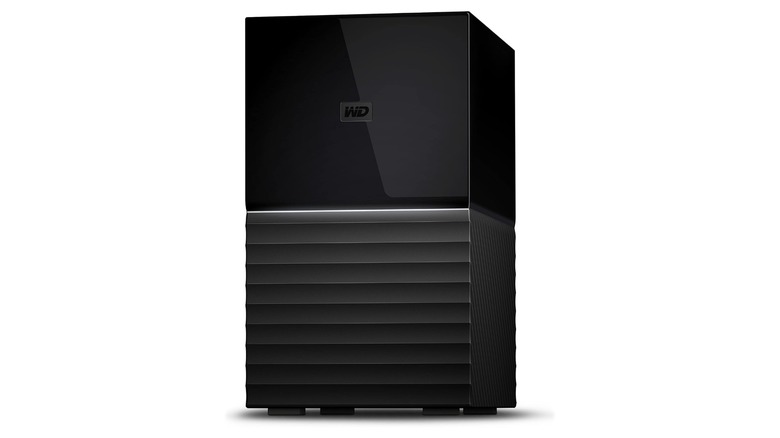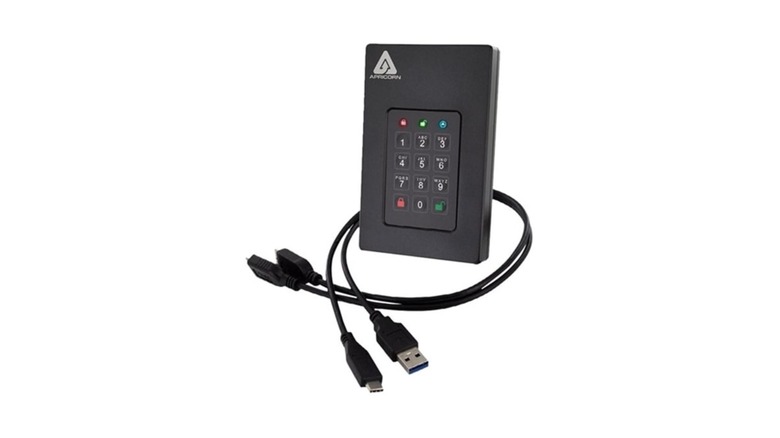10 Largest External USB Drives You Can Buy At Every Price Point
We may receive a commission on purchases made from links.
For archivists, content creators, and gamers, having large storage drives is a critical part of owning a computer. These tools are essential for organizing and backing up files, but there are some things you should know before buying an external hard drive. Over the past few years, storage systems have become much cheaper, allowing the average person to have hundreds of gigabytes packed within a tiny USB stick. But depending on the speed and capacity of what you're after, these external drives can end up being surprisingly costly.
There are numerous types of external storage systems available. USB sticks may be best for the average user, but HDDs and SSDs are also available in external formats and usually have much higher capacities than their stick-based counterparts. All of these will connect to your computer's USB ports, though, so they all technically count as "USB" drives — here are the largest ones at 10 different price points.
$25: 256 GB Flash Drive
While you can get something like a 32 GB microSD card for under $10, something that can actually hold a substantial number of files won't require much more than $25. In this case, USB sticks like the simple Amazon Basics drive have 256 GB storage. While this is a USB-A drive, meaning it will usually only fit into the standard ports on your computer, you can get sticks at this price with Type-C connectors as well. Some will even offer both connections at once, letting you connect to a wider variety of devices without going anywhere above your ultra-tight budget.
With their size and portability, there are ways you can use USB drives for more than just file storage. If that's the case, you likely won't need such high capacities in the first place, letting you cut your budget to about $7 for some of the smallest sticks available. But with how small these drives can get, the price isn't often justified. Two 128 GB drives can have a similar cost to a 256 GB one, but beyond that, you really shouldn't bother with smaller storage options unless you already know you won't need anything bigger.
$60: 1 TB Flash Drive
When looking at higher capacities, USB flash drives begin to fall off in terms of popularity. Higher capacities are more difficult to get in this specific form factor, and speed becomes an issue when trying to move larger files. Even so, there's at least one decently fast drive available for $60, and it offers a whole terabyte of storage. The Teamgroup C175 USB will be your best choice if you need such a high-capacity stick for whatever reason, managing to keep up with a 100 MB/s read & write speed.
One thing you'll have to be aware of with these sticks — as well as any other USB-connected device — is the format. Faster drives like these follow the USB 3.2 format, which means they'll end up slower if you plug them into a 2.0 port. It doesn't help that USB 3.2 was made even more confusing over the years with non-standard naming conventions. It shouldn't matter much if you don't plan on moving files too often, but you should still keep an eye on whichever port you end up using just to avoid any headaches.
$80: 2 TB HDD
Jumping from $60 to $80 and expanding your choice of drive can lead to some exponential value. While you'd struggle to find a high-capacity flash drive, external hard drives are a different story entirely. You can get up to 2 TB at this price point, as shown by the Toshiba Canvio Basics HDD, which is just over 4 inches long and only 5.3 ounces, despite its hefty capacity.
One thing to note is that hard drives like this one have quite a few moving parts inside. This can lead to the internal component breaking for some reason or another, forcing you to lose any data you stored inside. You should be aware of signs that your external hard drive is failing and try to avoid handling it too roughly. As the prices get higher and the capacities get larger, this will be an important concern, as malfunctions will lead to a greater loss of both money and data.
$130: 4 TB HDD
You can find a surprising amount of value from something like the WD Elements 4 TB external drive. Drives with this capacity are common in the $130 price range, with a wide number of vendors offering their unique designs. In fact, this price point has options for those who want even more storage, with an extra $10 able to net you an external drive with 5 terabytes instead of 4. If you're willing to spend over $100 on a drive, you probably aren't going to feel very restricted in your selection.
There are options beyond HDDs just above $100 as well, but their storage capacity isn't anywhere near as impressive. External solid state drives can only really be found with 1 TB available here, with 2 TB models priced even higher than these 4 TB hard drives. You could also just double your capacity with the help of an internal HDD, but these require special adapters to connect via USB. When it comes to the right combination of cheap, high-capacity, and portable, an external hard drive will be your best bet below $200.
$160: 8 TB HDD
A $130 drive might only have 4 TB storage if it's external while an internal drive can boast 8 TB at that same cost. However, for just $30 more, it's possible to double your capacity without needing to rely on the additional purchase of an adapter for USB connections. The Seagate Expansion is a prime example of one such drive, pushing the limit of the below-$200 price point with solid capacity and data recovery services in case something happens to the device.
With how much space video games can take up these days, 8 TB hard drives are among the best external drives for your Xbox Series or PlayStation consoles. Since these consoles are usually tethered to one spot, a lot of the risks that come with external drives can end up being avoided as well, due to a lack of constantly being moved around or disconnected. If you don't have very good internet speeds, they can also save you the headache of constantly having to delete and reinstall games as you go through your library. For digital gaming enthusiasts, an 8 TB drive can end up being one of the best purchases you'll ever make.
$300: 22 TB HDD
If you're willing to jump your budget for external storage up to $320, you'll be looking at about 20 TB. That's the case for the WD Elements drive, which ends up looking more like a miniature PC tower thanks to its size. The absolute maximum you can get from this drive is 22 TB, thanks to Seagate's previously-mentioned Expansion drive, available for $300 on its official website. Unfortunately, unlike the under-$200 range, you really don't have many options at this price point.
Very few companies make storage devices today with such large capacities, even when focused on internal drives. It was only back in 2018 when Western Digital's hard drive lineup gained a 15 TB behemoth, with most other companies lacking options above 10 TB today. You should expect these limitations to continue as the prices and capacities get higher, with only specialized brands making these extra-expensive external storage devices.
$500: 8 TB SSD
While it might not be one of the fastest portable SSDs you can buy, the Samsung T5 EVO is one of the largest, offering 8 TB storage at just under $500. It's also a solid-state drive, which means it's still going to be faster than just about any hard drive out there. The trade-off, as you might expect, is in overall capacity. SSDs are far more expensive than HDDs whether you're looking at internal or external options, and $500 for an 8 TB drive can be a raw deal compared to $300 for a 22 TB drive.
If you decide to go for a solid-state drive, you'll be paying almost purely for the speed. Few people will need more than 8 terabytes — it's a lot of space. But quick file transfers and long-term durability are universally useful, making a high-capacity SSD potentially more worthwhile than a hard drive with more than twice the storage space.
$1,100: 22 TB Encrypted HDD
You'll find a few non-standard options beyond the $1,000 price point. The Apricorn Aegis Desktop Padlock might only go as high as 22 TB for nearly $1,100, but there's a reason why it costs so much. The Aegis Padlock is an ultra-protected secure hard drive, encrypting all data and keeping itself secure with the help of a physical keypad. For those especially concerned about getting their storage device lost or stolen, there are few alternatives that can compete with Apricorn's offerings.
Note that this drive requires an external power connection. This isn't uncommon among large external drives, though most smaller options get their power through the same plug that oversees data transfers. In the case of encrypted hard drives like the 22 TB Aegis Padlock, that extra power makes sure the keypad will work when you type your PIN into it. An encrypted drive isn't much help if it locks out your access to your own files, after all.
$1,200: 44 TB HDD
Sitting at the apex of consumer-level external hard drives is the 44 TB WD My Book Duo. This beast of a device costs around $1,200 and has password protection, extra USB hub ports, and more terabytes than the average person will know what to do with. Even with all these benefits, the drive only offers USB 3.1 and not a faster 3.2 version. Still, this ultra-high-capacity My Book Duo could be the only external HDD you'll ever need.
The 44 TB My Book Duo uses two 22 TB drives running in a RAID array. It really stretches the definition of an "external drive" as a result, but it's worth mentioning due to its relative availability compared to other RAID arrays. You can find these at even higher capacities such as 72 TB, but their stock is lacking outside of unauthorized third-party sellers. Besides, at that point, you're pretty much just piling as many hard drives into a single connection as you can.
>$5,000: 16+ TB Encrypted SSD
The Apricorn Aegis Fortress L3 goes beyond what most other drives are capable of. Even internal SSDs don't have as much storage as this at a consumer level, but if you're spending over $5,000 on a single 16 TB storage device, you probably aren't the average consumer. While the Fortress has a clear focus on security — namely an external keypad and built-in encryption — much of its price comes from its voluminous capacity.
To say the Aegis Fortress L3 "doesn't come cheap" would be an understatement. Even from Amazon, this external SSD costs over $14,000. You can get it cheaper on the official Apricorn website, but that'll still cost you about $13,000. It's an absolutely staggering cost, but if you can afford it, you'll be one of the few owners of a 20 TB SSD — as long as you ignore all the enterprise-grade drives used in data centers.
